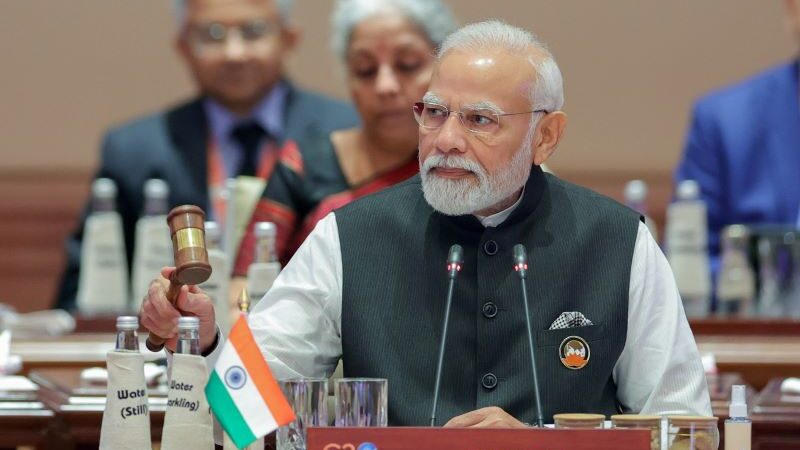The world’s largest economies agreed to push for a tripling of renewable energy capacity by 2030, but made no progress on oil and gas phaseout
Leaders of the world’s largest economies have backed efforts to triple renewable energy capacity by 2030, but failed to make any progress towards a commitment to phase out fossil fuels.
Following fraught negotiations, G20 countries clinched an agreement in India’s capital New Delhi on Saturday afternoon.
Raising the bar on climate targets was a priority of India’s G20 presidency, which had placed big stakes on the event’s success. Across Delhi, it was impossible to escape the gaze of Prime Minister Narendra Modi, his face alongside motivational slogans on huge billboards.
His main negotiatior Amitabh Kant hailed the agreement as the “most ambitious document on climate action” so far, striking a triumphant figure during the press conference.
But deep fault lines remain on fossil fuels ahead of the Cop28 climate summit later this year.
Renewables breakthrough
The G20 member countries together account for over three-quarters of global emissions and gross domestic product, and a cumulative effort by the group to decarbonise is crucial in the global fight against climate change.
The big breakthrough was on renewables. The final text includes a commitment to “pursue and encourage efforts to triple renewable energy capacity” by 2030. That target is vital to keep the goal of limiting the rise in global temperatures to 1.5°C within reach, according to the International Energy Agency.
Mexico’s ruling party picks climate scientist for presidential run
The European Union and the United Arab Emirates, the Cop28 hosts, have made it a centerpiece of their respective battle plans for the climate summit. When it was first announced, experts thought the pledge would find broad consensus. But at the G20 energy ministers’ meeting in July, Saudi Arabia, Russia and China blocked a deal.
One and half months later leaders broke the deadlock. It is welcome news for the Cop28 president-designate Sultan Al-Jaber, who said “the G20 has made important progress” and he was “grateful for the commitment made” on the renewable energy target.
Carbon-capture caveat
Getting the leaders to unite behind it in Delhi has come alongside concessions on other fronts. In the same paragraph, the declaration says G20 countries will “demonstrate similar ambition with respect to other zero and low-emission technologies, including abatement and removal technologies”.
The language covers controversial carbon capture and storage (CCS) technologies, favoured by oil-producing countries like Saudi Arabia and the UAE.
CCS remains expensive and unproven at large scale. Many climate campaigners call it a “distraction” that gives fossil fuel companies a licence to keep extracting more climate-harming coal, oil and gas.
Phase-out failure
G20 leaders also failed to move the needle on commitments to phase out polluting fossil fuels. This was referred to as “indispensable” to achieve a net-zero goal by the United Nations climate body in the first Global Stocktake report published on Friday.
The Delhi decl
Read More







Never miss a story. Join us on social.